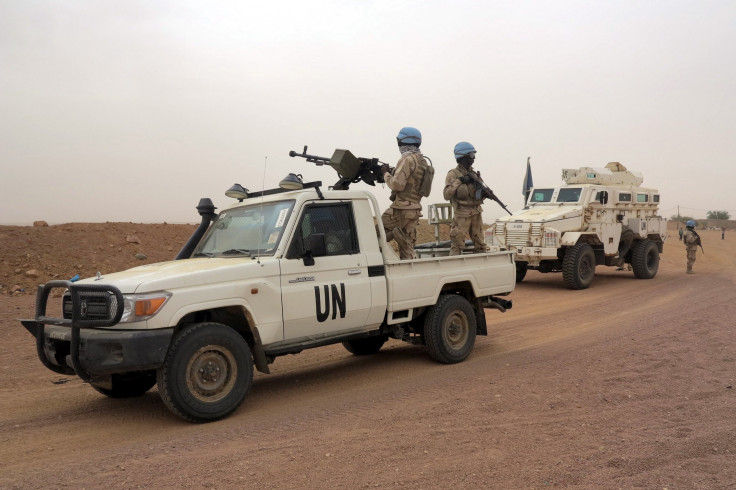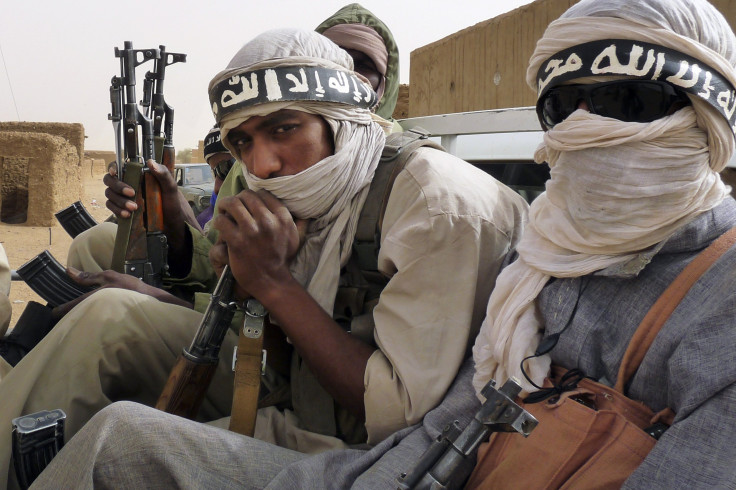Mali: The Deadliest Peacekeeping Mission In The World

Gunmen dressed in plain clothing ran up to the Byblos Hotel in the central Malian town of Sevare last week, opening fire at the few government soldiers who were protecting its entrances. The gunmen barged through the doors of the hotel with one mission in mind: to take as many people hostage as possible. Some hotel employees and visitors hid in cupboards, while others were detained by the militants. The siege lasted more than 24 hours and ended when the military stormed the hotel. In all, 12 people were killed, including civilians and members of the United Nations peacekeeping mission.
The attack on the hotel in Sevare was just one of many this year that have focused not only on civilians and government soldiers but also on members of the U.N. peacekeeping mission in the country. Last month, six U.N. peacekeepers were killed in an attack by Ansar Dine rebels in Timbuktu, an area that the rebel group moved into in 2012 during the political unrest in the country. Ansar Dine, designated as a terrorist organization by the U.S. in 2013, formed during the Malian political turmoil of 2012. All the peacekeepers attacked were from neighboring Burkina Faso.
The U.N. has reported 54 of its peacekeepers have been killed in Mali this year, making it the world’s deadliest peacekeeping mission at present. The mission in Mali has the highest average yearly fatality rate for all peacekeeping missions, according to U.N. figures. The organization just approved funding for one more year of the mission, and things are already off to a rocky start under the new accord. The force is now dealing with new, unprecedented threats in the southern part of the country, which until recently had remained largely muted.
Mali’s deteriorating security situation and tough terrain constitute conditions similar to those peacekeepers have faced in other countries, including Sudan, Somalia and the Democratic Republic of Congo. Between 2001 and 2015 to date, there have been 255 peacekeeper deaths in Congo alone. From 1960 to 1964, there were 249 peacekeeper deaths in that country. Meanwhile, 220 peacekeepers have died during the ongoing African Union/U.N. hybrid operation in Darfur, Sudan.
“We are working in a very difficult environment, an environment with asymmetric threats such as those posed by terrorists and those posed by rebels that engage in drug trafficking,” said Radhia Achouri, a representative of the U.N. peacekeeping mission in Mali.
As of last month, the U.N. mission in Mali consisted largely of about 9,100 military personnel deployed at 12 different locations throughout the country. About another 1,000 people are deployed as police. The members of the mission come from 68 different countries. The goal of the mission is to support, monitor and supervise the implementation of ceasefire agreements and to protect civilians.
Mali has been mired in violence since 2012 when ethnic Tuareg rebels overthrew the government. The ousting of President Amadou Toumani Toure created a vacuum that allowed for the rise of extremist rebel groups connected to al Qaeda in the Islamic Maghreb (AQIM), a branch of the broader al Qaeda network. The government of Mali requested international help, and French forces intervened, followed by the U.N. peacekeeping mission. Since then, the government and rebels have attempted to sign peace agreements, but talks have broken down each time. The Malian government and a semimoderate ethnic Tuareg rebel umbrella group signed a peace deal in Bamako in June, but it is unclear whether that pact will hold given the recent violence in the country.
There are dozens of rebel groups in Mali, some connected to the Tuareg rebel movement, others connected to AQIM. Several of the Tuareg rebel groups dominant in the north signed the recent peace deal with the government, with both sides promising to put down their weapons. But other groups, specifically those connected to AQIM, made no such promise and are now -- more than at any time since the beginning of the year -- attacking convoys and outposts of the Malian military and the U.N. peacekeeping mission in the country.

“Mali’s governmental presence is not particularly robust in the north,” said Hilary Matfess, a researcher with the Johns Hopkins University School of Advanced International Studies. “AQIM might be focusing its efforts on the most robust military security presence there, which is the U.N. mission.”
The northern part of Mali is still an area of concern for Malian officials, but the southern part is also becoming more violent, especially within the past two weeks as Ansar Dine has ramped up its attacks near the capital. The group is associated with the Saudi-inspired Salafist/Wahhabist brand of Muslim ideology, even though most people in Mali identify with the Sufi sect -- often defined as a faction of Islam that follows the inner, mystical aspects of the religion.
Ansar Dine attacked towns on Mali’s borders with Ivory Coast and Mauritania last week, and leaders of the group say they are planning more raids. The group’s new threat prompted Ivory Coast forces to carry out a mission inside Mali Wednesday in an attempt to track down rebels who are believed to be hiding in the Sama forest.
Statements by the group’s leaders and the attacks carried out by rebels within the past week mimic those of groups such as Boko Haram, the Nigerian militant group that is trying to expand from its land in the country’s Borno state to Chad and Cameroon.
Ansar Dine and other extremist groups are only growing stronger, especially with the growing drug- and human-trafficking networks in the region. Each year, thousands of migrants from places such as Burkina Faso, Niger and Sierra Leone, as well as Mali, pay as much as $500 apiece for smugglers to take them north to Libya, where they get on a boat and head to Europe. This year, a record number of migrants have attempted to make the journey to Europe, the U.N. said last month.
Given the security difficulties in the country, the U.N. peacekeeping mission in Mali has frequently asked Geneva for better equipment. In a recent U.N. report, the head of the Mali mission said his forces are frequently targeted by armed groups and his troops do not have the necessary weapons to ward off attacks.
“We need to be fully capable of facing this environment in all aspects,” Maj. Gen. Michael Lollesgaard, the commander of the peacekeeping mission in Mali, said in the report. “That means capability to face hostile armed groups hiding amongst the population and to face challenging climates, geography and infrastructure.”
© Copyright IBTimes 2025. All rights reserved.





















